Graduate Funding in Thematic Areas
Cornell Atkinson’s Graduate Research Grants program is supported by generous gifts from Bruce H. Bailey ’74, Dan ’47 and Pat Cornwell, Laurie Paravati Phillips ’78 and Duane Phillips ’78, and other Cornell Atkinson donors.
How to Apply
Eligibility:
- Cornell graduate students
The 2025 Cycle Is Closed:
- Previous Request for Proposals
Questions or More Info:
Recipients

Eighteen recipients across research themes Accelerating Energy Transitions, Advancing One Health, Increasing Food Security, and Reducing Climate Risk from Anthropology, Applied Economics & Management, Chemical and Biomolecular Engineering, Chemistry and Chemical Biology, Communication, Ecology & Evolutionary Biology, Economics, Entomology, Mechanical & Aerospace Engineering, Plant Biology, and SIPS Horticulture
Ruohong Chen (Mechanical and Aerospace Engineering)

Remediating Groundwater Through Biomineral Precipitation Using Designer Bacterial Communities
Advisor: Jingjie Yeo
Groundwater contamination is a critical environmental issue. Permeable Reactive Bio Barriers (PRBBs) present a sustainable and cost-effective solution by harnessing microorganisms to remove pollutants through biomineralization processes. The efficiency of PRBBs is influenced by factors such as the composition of microbial communities, the risk of clogging as biofilms and biominerals form, and the multiple interactions between bacteria and porous materials. In this project, we aim to quantify the effects of the multiphysical interactions between bacterial communities and their environment. We will develop novel computational models for bacterial community design and characterization. With these models, we will unveil the regulatory mechanisms of environmental factors on biofilm and biomineral formation in PRBBs. To validate our models and their predictive capabilities, we will also collaborate with experimental groups that characterize biofilm and biomineral formation. We will use our model to design sustainable and highly effective PRBBs that can adapt to the environment.
Natalia Correa Sanchez (Global Development)
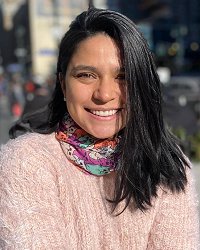
The Forests of the Future: Understanding Forest Conservation and Agricultural Dependency in the Tropical Dry Forests in the Colombian Caribbean
Advisor: Wendy Wolford
Correa-Sánchez’s research examines the relationship between forest conservation and agricultural dependency in Colombia’s Tropical Dry Forests, focusing on Tierralta in the Department of Córdoba. Tropical Dry Forests are critically endangered ecosystems, yet they receive less policy and research attention than tropical rainforests. My research explores how state agencies, peasant communities, NGOs, and private actors shape land use, ownership, and conservation strategies. I hypothesize that while state policies prioritize market-based conservation, peasant communities emphasize land rights that support agriculture vital to their livelihoods. By framing these perspectives as relational rather than conflicting, my study seeks to promote local participation in forest governance, balancing conservation with resource-dependent livelihoods. I will use qualitative methods such as interviews and participant observation to focus on land reform initiatives like the Alto Sinú Peasant Reserve Zone. Findings aim to inform forest governance debates by integrating local practices and policies to address conservation and food security challenges.
Samantha Davies (Biological and Environmental Engineering)
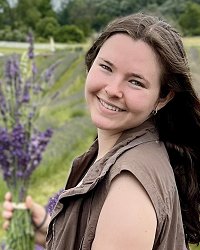
Predicting Methylmercury Concentrations from Methane Measurements in Lakes
Advisor: Jacqueline Gerson
Methanogens are anaerobic microbes that both convert organic matter into methane (CH4) – a potent greenhouse gas – and convert inorganic mercury (Hg) into toxic methylmercury (MeHg), which bioaccumulates in fish, posing risk to humans and animals who consume them. Despite their linked cycling by methanogens, methane and methylmercury have rarely been studied simultaneously in freshwater. This project will examine the relationship between methane and methylmercury production to ultimately create a model that estimates methylmercury concentrations from methane concentrations. This model will take advantage of the abundance of methane data for lakes, streams, and ponds, which are cheaper and easier to acquire than methylmercury data. Davies will create a robust dataset of estimated methylmercury concentrations which could supplement the lack of methylmercury data for freshwater bodies. This research will enable better understanding of the health implications of methylmercury on communities globally.
Malembe Dumont Copero (City and Regional Planning)
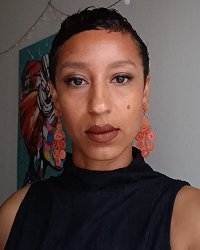
Repairing the Land to Repair the Body: Environmental and Embodied Health Experiences of Relocation in San Juan
Advisor: Linda Shi
The expansion of relocation as an environmental justice and climate adaptation solution brings questions about the exacerbation of preexisting health inequities, but also about processes of collective resistance by communities to continuously try to be healthy. Copero’s research takes a historic approach to the study of pre-, during-, and post-relocation processes and communities’ experiences within the continuous iteration of disasters in self-built communities along the Caño Martin Peña in San Juan, Puerto Rico. Her collaborative research aims to point to the historic processes under public health discourses that displaced settlements in the area and created health inequities. It also aims to understand current community-based relocation efforts along Caño to avoid the continuation of displacement and improve community health. At the core of Malembe’s efforts is centering embodied health experiences of relocation as narrated by relocated residents. As the continuous iteration of disasters becomes the norm, this research can offer empirical knowledge to improve climate adaptation planning by learning from community-based efforts to advance justice and improve health.
Alexander Gonzalez (Chemical and Biomolecular Engineering)

Policy-Driven Electrochemical Solutions for Converting Real-World CO2 Emissions Into Renewable Fuel
Advisor: Tobias Hanrath
Gonzalez’s research focuses on pulsed electrochemical CO₂ reduction (PECR) across multiple length scales, investigating how variations in catalytic materials change the interfacial environment to control product selectivity, to improve carbon capture for re-use. At the molecular level, Gonzalez uses techniques like differential electrochemical mass spectrometry and attenuated total reflection surface-enhanced infrared absorption spectroscopy, to uncover how pulsing influences local reaction conditions. These insights inform the design of scalable electrochemical systems, optimizing reaction environments for enhanced efficiency. Beyond fundamental studies, Gonzalez works to translate PECR for industrial use and apply it to CO₂ point sources requiring mitigation, such as effluent gas streams and emissions from agricultural operations. By integrating electrochemistry, materials science and computational modeling with climate and energy policy considerations, he aims to develop scalable, sustainable solutions for carbon utilization and greenhouse gas mitigation across diverse sectors.
Woojin Huh (School of Integrative Plant Science, Horticulture Section)

Impacts of Repetitive Drought on Seasonal Dynamics of Fine Roots and Nonstructural Carbohydrates in Temperate Forest Ecosystems
Advisor: Taryn Bauerle
Forests sequester approximately 50% of terrestrial carbon, but increasing drought frequency threatens their resilience and carbon dynamics. This study investigates the long-term impacts of repetitive drought on mature trees. It focuses on drought legacy effects and how they influence carbon allocation and root dynamics, essential for understanding forest responses to climate extremes. Conducted at Kranzberger Forest in Freising, Germany, the study uses experimental plots with Norway spruce (Picea abies) and European beech (Fagus sylvatica), subjected to either first-time or repeated drought treatments, in single-type and mixed-species setups. The research examines fine root phenology, longevity, and nonstructural carbohydrate dynamics across tree organs through seasonal observations. This study will provide critical insights into forest responses to climate extremes, informing forest management strategies to enhance resilience, protect carbon storage, and sustain ecosystem services.
Alexandra Lim (Chemistry and Chemical Biology)
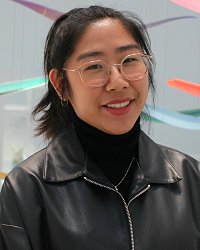
Accessing Hydroxide-Based Metal-Organic Frameworks for Direct Air Capture via High Concentration Synthesis
Advisor: Phillip Milner
Carbon capture and sequestration and direct air capture are key initiatives to minimize anthropogenic CO2 emissions and combat global climate change. Current amine-based technologies are prone to degradation from oxygen and heat. Oxygen-based nucleophiles have shown potential as alternatives. In particular, nucleophilic metal-hydroxide (M–OH) groups in metal-organic frameworks (MOFs)—porous coordination polymers constructed from organic linkers and inorganic nodes—have shown high carbon capture capacity under high-temperature and humid conditions. However, progress towards direct air capture in current M–OH-containing MOFs is restricted by specialized materials and/or inefficient methods to install M–OH groups, limiting their suitability for industrial application. My research aims to streamline MOF syntheses and build a library of M–OH-containing MOFs to determine the key structure and property relationships that underpin their reactivity towards CO2 and suitability for direct air capture.
Dan Loh (Plant Biology)

Improving Tobacco Growth With a Superior Hornwort Rubisco and Its Assembly Factors
Advisor: Laura Gunn
Strategies to improve crop yields must include increasing photosynthetic efficiency to ensure food security in the face of climate change and population growth. Ribulose-1,5- bisphosphate carboxylase/oxygenase (Rubisco) is the crucial gateway enzyme for carbon dioxide fixation, but it is also the main limiting factor of photosynthesis. Rubisco engineering thus presents an opportunity to improve photosynthetic efficiency and crop productivity. Loh’s project aims to do so by introducing a kinetically superior Rubisco, belonging to the hornwort Anthoceros agrestis (AaRubisco), into tobacco, a major crop species and model organism for transgenic plants. Subsequent analyses on plant growth and Rubisco kinetics will determine if tobacco photosynthesis and growth are indeed improved. This will lay the foundation for future research in Rubisco engineering. Given Rubisco’s crucial role in photosynthesis, it has far-reaching impacts on plant physiology and should be part of a holistic approach to improve crop productivity.
Daniel Petticord (Ecology and Evolutionary Biology)
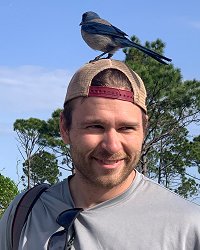
A Cryptic Crisis: The Contribution of Subsoil Phosphorus to the Eutrophication of the Everglades
Advisor: Jed Sparks
Petticord’s research investigates the role of subsoil phosphorus in driving excessive nutrient pollution in the Everglades’ waterways. Despite extensive phosphorus control measures, Florida’s waterways remain above federal thresholds, exacerbating harmful algal blooms. The study focuses on spodic horizons—deep soil layers that can store and later release phosphorus due to seasonal water table fluctuations. Because traditional field sampling methods are inadequate, the project employs ground-penetrating radar at Buck Island Ranch, a Long-Term Agroecological Research site, to map phosphorus-rich subsoils across varied pasture management histories. The study integrates deep soil coring and physiochemical analysis to validate radar data, assessing phosphorus mobility and its implications for water quality. Findings will inform improved land management practices to mitigate legacy phosphorus loss, ensuring long-term environmental resilience and public health protection. This work contributes to broader ecological research on nutrient cycling in highly weathered tropical and subtropical soils.
Sylvana Ross (Entomology)

Ride With Me: Exploring Gene Expression Variation in Tapinoma Sessile Across Segregated U.S. Neighborhoods
Advisor: Corrie Moreau
The concrete and asphalt that build our cities are assembled with generational biases and prejudiced political and social practices that unevenly distribute resources across different communities. This causes an urban mosaic of environmental conditions across neighborhoods that can shape the adaptations of urban wildlife, driving evolutionary responses to the unique pressures of human-altered landscapes. This novel approach to ecological and evolutionary dynamics compares the socioeconomic influences within urban ecosystems to the physiological and genetic adaptations seen in urban wildlife populations. Ross will use the native North American ant species Tapinoma sessile to understand the impacts of historical housing segregation on physiological and genetic adaptations in urban wildlife. This project seeks to understand the genetic mechanisms of urban adaptation by examining differential gene expression across populations from racially segregated neighborhoods, with correlated environmental stressors, such as temperature and pollution.
Anna Shattuck (Entomology)
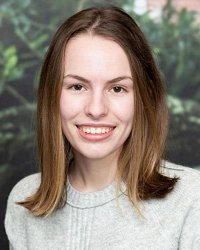
The Effect of Dengue Infection and Humidity on the Thermal Preferences of Ae. albopictus
Advisor: Courtney Murdock
Aedes albopictus is a highly invasive mosquito species that is an important secondary vector of several diseases, including dengue. Predictions suggest that because of climate change, Ae. albopictus will continue to expand its range, presenting a significant public health threat. Models to predict thermal suitability for vector-borne disease transmission use mosquito-temperature trait relationship data that are typically collected in the lab across a range of constant mean temperatures. While these models are insightful, they do not account for the likelihood that mosquitoes are behaviorally selecting more suitable microhabitats. Shattuck will determine if mosquitoes are behaviorally optimizing the microclimate they experience, and then she will update predictions on temperature suitability for dengue transmission under different climate change scenarios to include mosquito microclimate selection behavior. By understanding the effects of behavior on vector-borne disease transmission, we can optimize control strategies to mitigate potential public health risks in the face of climate change.
Shikhar Dinesh Singh (Chemical and Biomolecular Engineering)
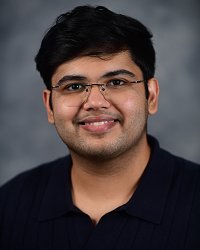
Development of Metal-Organic Framework (MOF) Functionalized Electrospun Microporous Polymer Nanofibers for Post-Combustion CO2 Capture and Humid Temperature-Swing Adsorption
Advisor: Yong Joo
Singh seeks to develop an innovative carbon capture system for post-combustion CO2 capture, utilizing advanced metal-organic frameworks (MOFs) encapsulated within nanofibrous polymer membranes. By leveraging a gas-assisted electrospinning method, he aims to create new composite nanofibers with tailored chemistry and structure that repel water. These materials are designed for high CO2 capture capacities and efficient regeneration. The proposed approach addresses key challenges in CO2 capture technologies, such as effective selection of CO2 vs. other chemicals, water resistance, energy efficiency and durability. This research contributes to global carbon capture and storage efforts, offering a promising pathway for industrial scalability and impactful climate action.
Meredith Theus (Ecology and Evolutionary Biology)
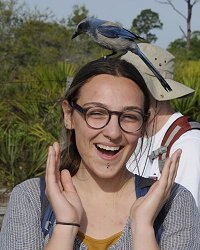
Effects of Plant Biodiversity on Wetland Greenhouse Gas Emissions
Advisor: Meredith Holgerson
My research focuses on the relationship between biodiversity and wetland carbon cycling. Wetlands are large sources of greenhouse gases (GHGs), and plants influence GHG production, degradation, and transport pathways. However, it is unclear how plant diversity and the composition of species and traits influence GHG dynamics, despite the high levels of biodiversity supported by wetlands. Theus’ project investigates the effects of different combinations of wetland plant species richness and functional diversity on GHGs. Understanding how plant communities drive GHG emissions from wetlands may strategically be used to conserve, restore, and potentially construct wetlands with lower emissions and allow for more accurate estimations of GHG fluxes.
Vaios Triantafyllou (Economics)
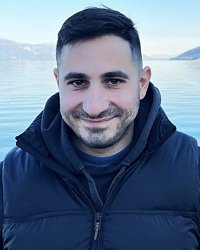
Green Supply Chains: The North-South Ripple Effects of Environmental Regulations
Advisor: Nicholas Sanders
Since 2017, several E.U. countries have adopted supply-chain due diligence laws, requiring multinational firms to ensure compliance with environmental standards across their supply chains. An E.U.-wide directive on such laws was adopted in 2024, to be implemented by 2026. This project aims to study the effects of laws that were in place before the directive on firms in India, a key developing trade partner of the E.U. Triantafyllou will study whether these laws lead Indian firms to adopt green technologies with positive environmental impacts and how they affect firm concentration, firm closures, greenwashing practices, export behavior, and labor dynamics. Additionally, he will assess whether the costs of compliance are passed on to European consumers through price increases. Ultimately, he aims to show how the costs of supply-chain due diligence laws are shared between developed countries and their developing trade partners, informing future policy design.
Amanda Vilchez (Communication)
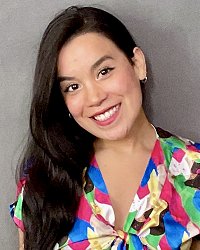
Vampire Bat Guano: Exploring the Risks and Benefits of a Pre-Hispanic Tradition for Human-Bat Healthier Coexistence
Advisor: Bruce Lewenstein
Vampire bats are often feared and viewed negatively due to their diet based on blood, their attacks on cattle causing economic loss, and their role in rabies transmission. However, in Peru’s Cusco Valley, this species holds a unique cultural and economic significance: for centuries, communities have used vampire bat guano as a natural fertilizer for maize, one of the region’s most culturally, socially, and economically important crops. This research seeks to map the implications of the traditional use of vampire bat guano through an analysis of perceived and observed health and environmental benefits and risks, relying on Quechua oral traditions and transdisciplinary researcher perspectives. This participatory research will contribute to a more nuanced, culturally informed perspective on One Health, expanding the understanding of how different ways of knowing, as Indigenous epistemologies, see the interconnectedness between wildlife, humans, and the environment to shape their perception of risks and benefits across their traditions.
Anna Whittemore (Anthropology)

Sustainability and Imperialism in the Ancient Andes through Stable Isotope Analysis
Advisor: Matthew Velasco
Though the pressures of anthropogenic climate change and globalized markets are unique to the modern world, ancient food systems offer insight for designing equitable and sustainable solutions to food insecurity today. Ancient and modern cultures in the South American Andes have developed a variety of adaptations to high-altitude and arid environments, including terracing and drought-resistant plants, drawing the attention of food security researchers. Whittemore’s research builds on these studies through stable isotope analysis of plant, animal, and human remains, reconstructing farming, herding, and food distribution practices among an ancient community—where she excavated in 2023—in the central Andes. By studying diet at the individual level, she will address how food consumption patterns related to other factors like nutritional status, migration history, and vulnerability to violence, as inferred through skeletal analysis.
Henry Williams (Sibley School of Mechanical and Aerospace Engineering)
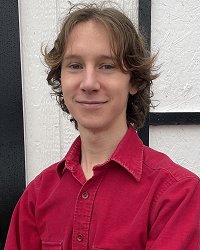
Digital Twin for Multi-use Solar Farm Design and Management
Advisor: Max Zhang
This project proposes the development of a solar farm digital twin platform built for robust modeling in the design phase and on-site decision-making in the operation phase. The proposed digital twin is at the forefront of a major shift in the renewable energy sector towards dual-use solar energy facilities that combine agricultural activities with solar, known as agrivoltaics. Williams also seeks to develop a physical twin for comprehensive testing and prototyping of the technology. Results will influence real-world, large-scale solar farm design in the coming years, cementing New York state as a trailblazer in accelerating energy transitions.
Hongdi Zhao (Applied Economics and Management)

Optimal Dynamic Adaptive Sampling to Minimize Child Malnutrition in Kenya
Advisor: Chris Barrett
Geographically targeted food assistance is essential to relieve human suffering from droughts, high food prices and other disasters, and to prevent lifelong adverse effects in at-risk children with severe acute malnutrition. Machine learning-based predictions of child malnutrition can be used to aid in early warning and response planning. However, government and humanitarian agencies generally face a tight budget between investing in data collection for early warning systems and the provision of relief food in the context of food emergencies. This project develops an optimal adaptive dynamic sampling model to balance these trade-offs, maximizing the impact of food relief while minimizing acute malnutrition. Using high-frequency monthly household data from Kenya’s National Drought Management Authority, the model optimizes resource allocation while adapting to new information. This project provides insights into optimal resource allocation strategies for effective targeting and resource utilization in food assistance interventions.
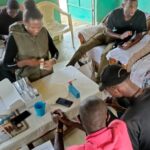
Fourteen recipients across Accelerating Energy Transitions (AET), Advancing One Health (AOH), Increasing Food Security (IFS), and Reducing Climate Risk (RCR): from Anthropology, Biological & Environmental Engineering, Chemistry & Chemical Biology, Entomology, Global Development, Government, Materials Science & Engineering, Mechanical & Aerospace Engineering, Natural Resources & the Environment, and Soil & Crop Sciences
Made Adityanandana (Global Development)
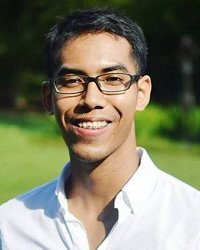
Mobilization of Surplus Populations for Food Security in Indonesia’s Resettlement Project
Advisor: Jenny Goldstein
Aditya is a Ph.D. student in the Department of Global Development. His research examines agrarian transformation, food security, and population resettlement in Indonesia. Population resettlement has been integral to state-led agricultural projects since the Dutch colonial government relocated landless poor to the archipelago’s periphery in the early 20th century. Following independence, the Indonesian government has continued resettlement with the aim of bolstering food production. With its focus on the recent agri-food megaproject in Central Kalimantan, this research offers a vantage point in understanding the potential and constraints of distributive policy in ensuring reproduction of smallholders and securing food production.
Alonso Alegre-Bravo (Biological & Environmental Engineering)
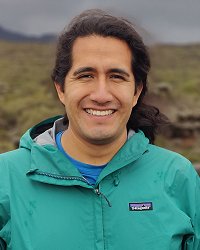
Seeking a More Justice Oriented Indicator for Access to Electricity in Rural Communities of Latin America: The Guatemalan Case
Advisor: Lindsay Anderson
Alegre-Bravo’s dissertation examines rural electrification challenges in Latin America from a public policy and community perspective. Despite high rates of access to electricity in the region, rural communities describe electricity service as unstable, unaffordable, and unpredictable. Lack of or poor access to electricity hinders efforts to reduce inequality and poverty. Alegre-Bravo’s current research explores this discrepancy between official access to electricity metrics and the perceptions and realities of electricity access in rural communities in Guatemala. His work examines characteristics of electricity service, such as quality, availability, predictability, and affordability, in three rural communities in western Guatemala and the impact of unfulfilled electricity needs on these communities. His research highlights the limitations of current access to electricity indicators and will inform policymakers on how to include rural communities to achieve a just energy transition.
Alyssa de Villiers (Soil & Crop Sciences)
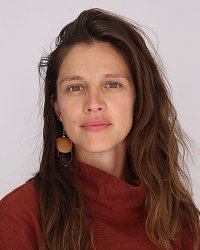
The Effects of Protective Sorption and Environmental Conditions on the Enzymatic Decomposition of Cellulose
Advisor: Carmen Enid Martinez
Soil organic carbon (SOC) is relevant to climate change in two crucial ways: Its turnover rate affects carbon dioxide addition to the atmosphere, and its buildup confers soil health benefits that promote agricultural resiliency in the face of a changing climate. Cellulose is arguably the most abundant biopolymer on Earth and is a major recurring source of organic carbon in both natural and agricultural ecosystems. Cellulose has a faster turnover time than the more recalcitrant lignin, making it a shorter-term control on SOC levels. In this research, de Villiers will examine the sorptive protection afforded to cellulose and low molecular weight organics under a variety of environmental conditions while integrating the use of density functional theory as a methodological technique to predict binding affinities of molecules at soil surfaces. This will further our understanding of the factors controlling cellulose decomposition rates and how we might push systems toward carbon accrual.
Songtao Guo (Materials Science & Engineering)

Combustion of Liquid Fuels at Elevated Pressures
Advisor: C. Thomas Avedisian
The combustion of liquid fuels emits soot particles, significantly impacting global climate change. Biofuels, while offering some reduction in emissions, are not exempt from this issue, particularly at high pressures. This study aims to investigate how pressure affects soot formation during the combustion of liquid fuels. Guo will examine the burning of an isolated droplet in a setup that encourages one-dimensional gas transport. This method is designed to establish a correlation between soot volume fraction and pressure, which could be crucial in identifying optimal operating conditions for engines to minimize soot emissions. This study will explore a range of pressures from atmospheric levels up to approximately 20 atm, focusing on a specific biofuel, iso-butanol. The insights gained from this study are anticipated to extend beyond iso-butanol, offering broader implications for reducing soot emissions across various fuel types.
Tamar Law (Global Development)
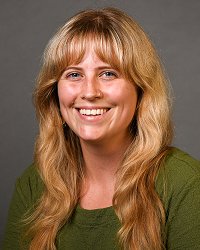
Mangroves for the Future: The Socio-Political Dimensions of Coastal Restoration
Advisor: Jenny Goldstein
In 2021, the United Nations declared a global decade of ecosystem restoration, marking a rise in rehabilitating ecosystems to address climate change worldwide. As part of this effort, Indonesia, home to over a quarter of the world’s mangroves, is completing extensive coastal mangrove restoration to reduce climate risk. Mangroves are essential green infrastructure, protecting against sea-level rise and storm surges. Moreover, they are extremely effective blue carbon sinks, referring to atmospherically significant carbon stores within coastal ecosystems. The growth of blue carbon is central to Indonesia’s low-carbon development plan and climate targets. My research project seeks to understand the politics of Blue Carbon governance by examining how state actors, locals, corporations, and scientists negotiate the restoration of Indonesia’s mangrove ecosystems. Taking a multi-sited ethnographic approach, this project combines semi-structured interviews, participatory mapping, transect walks, and document analysis to examine the social and political dimensions of mangrove restoration for blue carbon in Indonesia.
Alexandra Lim (Chemistry & Chemical Biology)
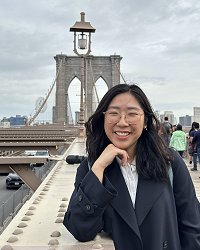
Tuning Carbon Capture From Air at Hydroxide Sites in Metal-Organic Frameworks
Advisor: Phillip Milner
Carbon capture and sequestration and direct air capture are key initiatives to minimize anthropogenic CO2 emissions and combat global climate change. Current technologies are largely limited to aqueous amine scrubbers, which are prone to oxidative and thermal degradation. Lim has demonstrated rapid CO2 capture with metal-azolate framework Co2(OH)4(btdd) – a porous, crystalline framework constructed from organic linkers and inorganic nodes – through HCO3- formation at nucleophilic OH- sites within the framework pores. This material was prepared using a novel and generalizable route: oxidation of the Co(II) metal center to a Co(III) halide followed by anion exchange to install the M–OH site. The proposed work aims to synthesize a library of M–OH-containing MOFs in order determine the key structure/property relationships that underpin their reactivity toward CO2 and suitability for direct air capture.
Laura Martinez (Entomology)
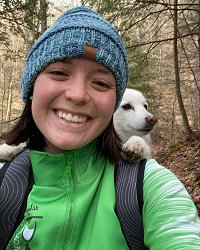
Investigating the Role of a Promising Volatile Control Technique on the Surrounding Insect Communities
Advisor: Jennifer Thaler
Crops grown for human consumption are greatly affected by pests. Most of these crop losses can be prevented or reduced through adequate pest control. Pesticide use can be effective but has a major impact on non-target organisms and contributes to negative impacts on human health. Integrated pest management strategies like biocontrol and organic chemical controls are sought-after alternatives. Recent findings show that behaviorally active chemicals, including predator odors, can have a protective effect on crops by deterring pests. However, these findings remain unexplored on larger agricultural scales, and their impact on the surrounding communities, including off-target organisms, remains unknown. This project investigates how a synthetic predator pheromone, isolated from the spined soldier bug, is affecting the broader agricultural community to explore if it could be used as a realistic, organic approach for pest management.
Tobias Mueller (Entomology)

Quantifying the Impacts of Antimicrobial Pesticides on Solitary Bee Microbiomes
Advisor: Scott McArt
Pollination, primarily from bees, benefits over 70% of the major food crops across the globe. During crop pollination, however, bees are exposed to high levels of pesticides. While the toxicological effects of insecticides on bees are relatively well understood, little is known about the impact of antimicrobial pesticide sprays, which unlike insecticides, are applied during bloom, when bees are actively pollinating. These antimicrobials are known to disrupt essential microbial associates of social honeybees, however, no studies have assessed their impacts on solitary bees, which represent 90% of bee diversity and are among the most important pollinators in many agricultural systems. Mueller’s work focuses on filling this gap and better understanding how commonly used antimicrobials are shifting solitary bee microbiomes and impacting their development.
Horace Owiti Onyango (Natural Resources & the Environment)
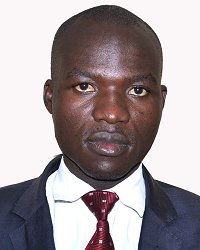
Harmful Algal Blooms: Exposure From Drinking Water for Small-Scale Fishing Households in Lake Victoria, Kenya
Advisor: Kathryn Fiorella
This study addresses the significant threat posed by harmful algal blooms (HABs) to water-dependent communities, particularly small-scale fishing communities near Lake Victoria, Kenya. Harmful microcystins from HABs can adversely affect human and animal health. The vulnerable fishing households, reliant on contaminated water sources, face risks to their liver, nervous system, and overall well-being. Despite their use of indigenous knowledge, the transparency of cyanobacterial HABs necessitates conventional testing to minimize exposure. Through a hybrid study design integrating biological tests and socioeconomic assessment, my research aims to determine the extent and factors of microcystin exposure in drinking water from source to glass. This unique focus on household drinking water distinguishes the study, contributing valuable information to the global dialogue on microcystins, contextual risk factors, and the vulnerability of small-scale fishing communities to HAB risks. The findings aim to inform strategies for anticipating, responding to, and recovering from the impacts of toxic algae.
Christina Pan (Government)

Power Beyond the Party: Trade, Industry Origins, and Local Government in China’s Clean Energy Transition
Advisor: Jeremy Lee Wallace
Pan’s research examines the domestic politics in clean energy transitions in developing economies. Her dissertation explores the state-society interaction in the clean energy industry and aims to conceptualize and explain the role of subnational actors – local governments and private entrepreneurs – across different clean energy-related sectors and across different time periods in China. In her project, Pan explores the factors that shape dynamics between different pro-clean energy groups in the domestic clean energy transition. Using comparative case analysis together with interviews, archives, and statistical analysis, this project sheds light on understanding the multi-level nature of government subsidy strategies in China, unpacks the idea of China’s state capitalism in the context of clean energy transition, and provides significant implications for the U.S. and the EU’s clean energy-related trade policies.
Roderick Wijunamai (Anthropology)
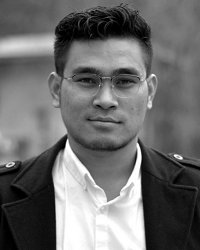
The Promise of Oil Palm in India’s Northeastern Borderlands
Advisor: Sarah Besky
Wijunamai is a Ph.D. student in the Department of Anthropology. His research is at the intersection of economic anthropology, political geography, and critical Indigenous studies. Taking the case of Nagaland in India’s Northeast, Wijunamai’s Ph.D. project examines how indigenous geographies affect, and are affected by, the making of a self-sufficient national economy. India is the world’s largest importer of edible oil. To contain its increasing demand, the government of India launched the National Mission for Edible Oil-Oil Palm (NMEO-OP) in 2014. Nagaland – alongside other Northeastern states – is one of the key sites where production is concentrated. Grounded in a long-term ethnographic fieldwork, Wijunamai’s research explores the confluence of a national economy and Indigenous livelihood strategies through the lens of India’s oil palm development.
Henry Williams (Mechanical & Aerospace Engineering)
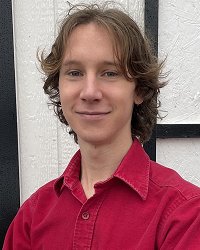
Digital Twin for Multi-Use Solar Farm Design and Management
Advisor: K. Max Zhang
Large-scale solar farms have potential to be co-located with agriculture and ecosystem services, but the current lack of robust modeling tools is a critical barrier for the adoption of these multi-use designs. This project involves the development of an innovative digital twin platform for solar farm modeling and management, built on the intersection of 3D modeling, microclimate simulation, and internet-of-things data. The digital twin will be used to design and customize 3D representations of solar farms, allowing for robust modeling and data analysis. This project is at the forefront of a major shift in the renewable energy sector and aims to achieve real-world impact with key industry partners.
Adele Woodmansee (Soil & Crop Sciences)
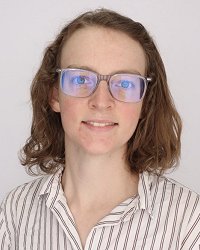
Agricultural Biodiversity for Climate Adaptation in the High Atlas: Exploring Underutilized Cereal Crops and Cereal Mixtures
Advisor: Andrew McDonald
Woodmansee’s research looks at underutilized cereal cropping practices in the High Atlas Mountains of Morocco. The High Atlas Mountains conserve in situ diversity for several Mediterranean crops, but this diversity is threatened by rapidly intensifying droughts and socioeconomic change. Cereal crops play an important role for both food and fodder in the High Atlas, but there are major gaps in knowledge about the extent and distribution of cereal diversity. Woodmansee will investigate millets and rye, underutilized cereal crops. She will also investigate cereal species mixtures (i.e., maslins), which have increasingly recognized value for adaptation but have been previously unstudied in Morocco. The project will include collections, surveys, and mother-baby trials that combine controlled irrigation trials with participatory farmer trials. This research will provide extensive knowledge about local cereal cropping practices in an understudied potential hotspot for cereal diversity.
Liming Zhao (Mechanical & Aerospace Engineering)
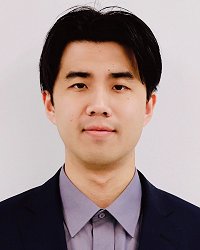
Modeling and Design of Sustainable Low-Carbon Living Building Materials
Advisor: Jingjie Yeo
The manufacturing of cement and concrete damage repair, crucial to construction, contributes significantly to CO2 emissions with an annual production rate of over 4 billion metric tons. The living building material, a mixture of concrete and ureolytic bacteria, is a promising sustainable alternative, the bacteria of which aid in reducing cement production and facilitating its repair via biomineralization activity, a process converting CO2 into carbonate. However, the efficiency of biomineralization is greatly affected by bacterial neighboring heterogeneous chemical and structural conditions, necessitating more quantitative studies. By developing a novel individual-based simulation model, Zhao aims to quantify the effects of the chemical and mechanical environment around each bacterial cell and, thereby, unveil the regulatory mechanism of the environmental factors on biomineralization in concrete.
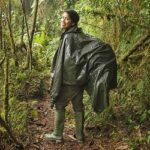
Fifteen recipients across Accelerating Energy Transitions (AET), Advancing One Health (AOH), Increasing Food Security (IFS), and Reducing Climate Risk (RCR): from Anthropology, Biological & Environmental Engineering, Chemistry & Chemical Biology, Communication Ecology & Evolutionary Biology, Global Development, Masters of Public Health, Mechanical & Aerospace Engineering, Population Medicine and Diagnostic Sciences, and Soil & Crop Sciences
Bayu Ahmad (Chemistry & Chemical Biology)

Visible Light Photo-switchable Carbon Dioxide Capture From Air (RCR)
Advisor: Phillip Milner
The rising carbon dioxide concentration in the atmosphere has become a serious threat, and its removal is necessary to reduce future climate risk. Current carbon capture technologies are mainly based on amine-based scrubbers, which face challenges such as susceptibility to oxygen and water and large parasitic energy costs. With this funding, Ahmad seeks to develop a photochemical capture-and-release system that harnesses solar energy to provide the energy required to remove carbon dioxide from air. The proposed system promises to be more energy efficient and resistant toward water and oxygen than current technologies, enabling a new low-cost strategy for selective carbon capture from emission streams and air.
Marvi Ahmed (Global Development)

Assembling the Development Frontier: Identity, Climate Vulnerability, and Agrarian Livelihoods in the Indus Delta Region (IFS)
Advisors: Fouad Makki, Wendy Wolford, and Sarah Besky
Ahmed’s research examines how neoliberal logics of community development entangle with socio-ecological relations in Sindh, Pakistan, a space that has long remained a frontier of agricultural extraction, ethno-nationalism and now acute climate vulnerability. Challenging the notion of climate change as the great leveler, she examines how pre-existing hierarchies profoundly condition climate vulnerabilities and how these dynamics are reshaped through the development frontier. In 2022, rising temperatures and intensified monsoon rains led to unprecedented “super floods” in the greater Indus delta region in Sindh. The region is lined with large export-oriented agricultural estates employing landless sharecroppers caught in cycles of debt bondage organized along caste lines, where low-caste communities form the most dispossessed groups. This precarity also makes them ideal candidates for donor-funded community development projects, urging improvement through market-driven initiatives such as entrepreneurship and microcredit. Examining how structural inequalities shape lived experiences of “empowerment-based” interventions and climate vulnerability sheds critical light on the work of development in an age of climate crisis.
Charlotte Albunio (Mechanical & Aerospace Engineering)
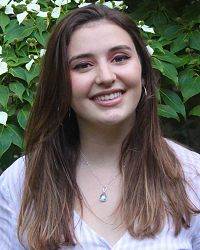
Additive Manufacturing and Burning Characterization of Wildfire-prone Tree Species (RCR)
Advisor: Sadaf Sobhani
Albunio’s research aims to help categorize the burning behavior of wood species that are commonly found in wildfire prone areas. Understanding this behavior is essential for creating models that will help predict how wildfires will spread. These models will have a serious impact on reducing the risks associated with wildfire spread, including increased health complications and destruction of communities. Previous research has been done to categorize wood burning, however the innate heterogeneity of wood has barred scientists from being able to create meaningful databases. To overcome this hurdle, Albunio will use additive manufacturing to control the properties of wood. This will be informed by X-ray data from naturally occurring wood as well as thermogravimetric analysis to determine the material’s thermal stability.
Camille Blevins (Ecology & Evolutionary Biology)
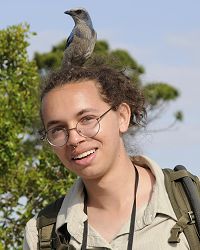
Closing Critical Knowledge Gaps in Ecosystem Methane Flux Under Sea-Level Rise (RCR)
Advisor: Jed Sparks
Blevins, who uses the pronouns they/she, is a Ph.D. student in the Department of Ecology and Evolutionary Biology working with Dr. Jed Sparks. Blevins’ research focuses on methane flux dynamics within coastal tidal wetlands during major environmental disturbances, such as sea-level rise. The proposed work will examine three critical methane flux pathways during a salt marsh restoration event that will elucidate a mechanistic understanding of surface methane flux pathway dynamics within coastal wetlands. The proposed work will leverage isotope analyses and infrared imaging to pinpoint changes to the methane production and consumption (oxidation) balance. Their work aims to provide the most comprehensive mechanistic representation of methane flux from this ecosystem with an eye toward identifying generalizable terms that can be applied to similar areas experiencing sea-level rise.
Aneesh Chandel (Soil & Crop Sciences)
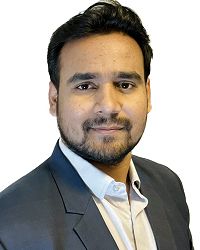
Empirical Measurements and Improved Model Representation of Hydraulic Redistribution as a Control on Function of Semiarid Woody Ecosystems (RCR)
Advisor: Yiqi Luo
Chandel is a soil and crop sciences Ph.D. student in the Luo lab at Cornell University whose research focuses on improving the model representation of plant-mediated water distribution between soil layers as a control on the functions of dryland ecosystems. Drylands cover more than 40% of the land surface and play a dominant role in global carbon sequestration. The current Earth system models are unable to simulate dryland ecosystem function, partly due to a poor representation of plant-available water dynamics. Chandel aims to utilize long-term observational data collected in AmeriFlux core sites in dominant dryland woody biomes in the Southwestern U.S. and employ the data assimilation approach to develop a robust dryland ecosystem model.
Liting Ding (Anthropology)

Living With Salinity: Development and Expertise in Sustainable Aquaculture for Building Climate-Resilient Mekong Delta (AET)
Advisor: Sarah Besky
Ding is a Ph.D. student mentored by Dr. Sarah Besky in the Department of Anthropology. Ding works with Vietnamese and international scientists, development consultants, and aquaculture farmers to tell a story of lives entangled with economic promises, expertise in rural development, and climate change. With this funding, Ding will conduct field research in Vietnam to explore sustainable aquaculture development as a solution for the climate-resilient future of the Mekong Delta. This project intends to understand the discourses surrounding sustainable aquaculture and the production of expertise in climate adaptation. By interviewing aquaculture scientists, development agency consultants, and other stakeholders engaged in sustainable aquaculture research and implementation, this project examines how technological innovation and transnational partnerships on sustainable aquaculture address climate change mitigation and create socio-economic impact.
Giancarlo D’Orazio (Mechanical & Aerospace Engineering)
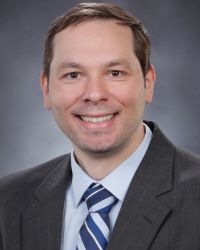
Leveraging Micro-Additive Manufacturing to Enable High Performance Electrochemical CO2 Conversion (AET)
Advisor: Sadaf Sobhani
CO2 reduction reactors are an effective means of transforming waste carbon dioxide into carbon neutral or negative fuel and chemical sources. In these reactors, gaseous CO2 flows into one side of the cell. In these cells, a porous membrane, called a gas diffusion electrode (GDE), separates the gas from a water-based electrolyte. As the cells operate, the electrolyte environment begins to change as new chemicals are evolved, and over the course of tens of hours the GDE will eventually flood. The research proposed will overcome these shortcomings and reduce flooding potential of the GDE via additive manufacturing. This will improve the operational lifespan of these reactors, enabling a long-term scaling solution to converting excess CO2 into carbon neutral or negative fuels and other chemical products.
Jarvis Fisher (Global Development)
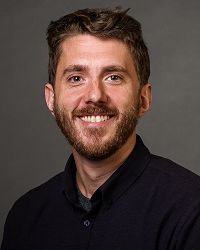
Food Self-Sufficiency, Agroecology, and Rice Production in Senegal (IFS)
Advisor: Rachel Bezner Kerr
Fisher is a Ph.D. student in the Department of Global Development. His research is focused on two approaches to food security in Senegal. For years, Senegalese government officials have promoted rice self-sufficiency by intensifying irrigated production in targeted riverine regions. Fearful of the social and ecological effects of these programs, a national agroecological coalition has formed to reject this approach and achieve food security through ecological intensification and local food sovereignty. Fisher’s project examines the transformative effect these two approaches have had on systems of rice production; their influences on farmer decision-making; and the analytical frameworks that have informed their design, implementation, and evaluation.
Sabrina Marecos (Biological & Environmental Engineering)
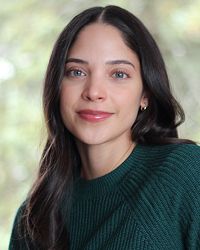
Effect of Metallophore Production on Mineral Dissolution With Gluconobacter Oxydans (AET)
Advisor: Buz Barstow
Marecos is a Ph.D. student in Buz Barstow’s lab in the Department of Biological and Environmental Engineering. Her research focuses on harnessing the bioleaching capabilities of the microbe Gluconobacter oxydans for the biomining of critical metals used in sustainable energy technologies. She is interested in understanding the effect of chelating compounds on the bioleaching capabilities of G. oxydans, with the aim of determining how they contribute to the mineral dissolution mechanism. This research will provide important insights regarding potential factors involved in the production of small-chelating molecules called metallophores, relevant properties of the biosynthesis genes that encode them, and the extent to which their production contributes to bioleaching. By studying the impact of metal-chelating molecules, this study aims to expand the understanding of mineral dissolution by G. oxydans and pave the way for more efficient biomining moving forward.
Jessica Noll (Population Medicine & Diagnostic Sciences)
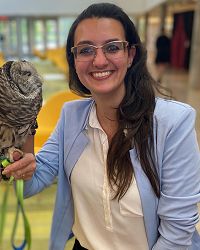
Characterization of the Biological Function of African Swine Fever Virus P30/P32 Protein (IFS)
Advisor: Diego Diel
African swine fever virus (ASFV) is a complex virus that threatens the swine industry worldwide. African swine fever (ASF), caused by ASFV, is a hemorrhagic transboundary disease of high social and economic impact with mortality rates reaching up to 100% in domestic pigs. Due to the high complexity of the virus, there are no vaccines or therapeutics available for ASF. Noll’s research is focused on the characterization of antibody and T cell responses against the high immunogenic protein p30/p32 of ASFV. Through a diverse array of assays, she is currently dissecting the function of antibodies elicited by p30/p32 as well as investigating the activation and function of T cell populations upon stimulation by p30/p32. The understanding of the immunological mechanisms stimulated by p30/p32 can lead to the rational development of novel subunit vaccines against ASF.
Timothy Ravis (Global Development)
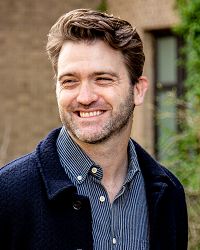
Understanding Resistance to Geothermal Energy in Indonesia (AET)
Advisor: Jenny Goldstein
Geothermal energy is subsurface heat that can be used to generate renewable, low-carbon electricity. Because of its relative abundance in Indonesia, experts see it as a cornerstone to that country’s energy transition. Yet uncertainty about its effects and profitability slows geothermal development across Indonesia. This research explores impediments to geothermal development by focusing on how development agencies, scientists, investors, and local residents negotiate the construction of new energy landscapes in Indonesia. It studies how these actors create certainty around geothermal development. Geological uncertainty motivates new financial schemes to shift the burden of investment risk to the state. Struggles over land affected by geothermal contributes to police militarization and the reworking of colonial-era laws differentiating surface and subsurface rights to property in land. Thus, this project explores both the impediments to a clean energy transition in Indonesia and how political power is produced alongside the resources that power industrial society.
Maria Rivera (Soil & Crop Sciences)
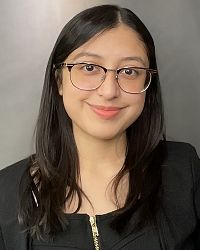
Enhanced Rock Weathering and the Persistence of Soil Organic Carbon (RCR)
Advisor: Johannes Lehmann
Enhanced rock weathering (ERW) is a carbon dioxide removal strategy that amends soils with crushed magnesium and calcium silicate rock to accelerate carbon capture in soils. The effect of ERW on soil organic matter has received little attention, but past literature in organo-mineral associations suggests potential for organic carbon accrual. Through experiments, Rivera will learn the basic mechanisms by which magnesium and calcium silicate minerals extracted from ERW influence soil organic matter persistence. The findings will contribute to a holistic understanding of ERW as a carbon dioxide removal strategy, improve model predictions for ERW, and contribute to IPCC’s knowledge for enhanced weathering, a strategy now necessary for mitigating anthropogenic climate change.
Ellie Socha (Ecology & Evolutionary Biology)
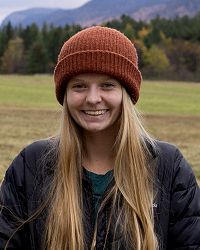
How Do Winter and Nutrient Conditions Interact to Regulate Year-Round Plankton Communities? (AOH)
Advisor: Meredith Holgerson
Climate change is shortening our winters, causing lakes to have less snow and ice cover, which is in turn influencing phytoplankton and food resources in lakes year-round. Yet, limnologists have long ignored winter periods in lakes, meaning that we have a poor understanding of how changing winter conditions will influence plankton, including phytoplankton and their zooplankton predators. This study aims to examine plankton communities year-round across a gradient of lakes with varying nutrient concentrations (from low to high productivity). The results of this research will inform how lake biological communities function throughout the year and give us insight into how communities may shift due to changing winter conditions. The findings will be especially relevant to One Health, as winter conditions coupled with lake nutrients shape phytoplankton communities, and ultimately control primary productivity, energy flow in food webs, toxin production, and lake oxygen availability.
Eric Teplitz (Public & Ecosystem Health)
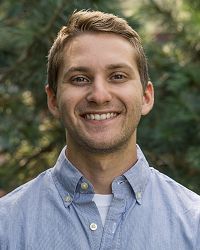
Public and Ecosystem Health Impacts of Aquaculture Systems in Lake Victoria, Kenya (AOH)
Advisor: Kathryn Fiorella
Harmful algal blooms are a global phenomenon that are increasing in frequency, duration, and scale as a consequence of anthropogenic nutrient pollution. Concurrently, aquaculture production systems, which are pivotal to achieving food security yet impact aquatic ecosystem health, are proliferating rapidly. Navigating the food systems transitions required to balance environmental health with human nutrition is a key challenge. The Lake Victoria system in East Africa is an emblematic model of these co-occurring challenges: Persistent harmful algal blooms are increasing in scale as a nascent cage aquaculture industry undergoes explosive growth to meet increasing demand for fish. Cyanobacteria-producing harmful algal blooms (cyanoHABs) are highly prevalent in Lake Victoria and involve production of a potent liver toxin known as microcystin that accumulates in fish populations. Teplitz’s project will investigate the risk of human toxicosis through farmed and wild-caught fish consumption, characterize the spatiotemporal occurrence of cyanoHABs, and identify relevant fish health challenges.
Amanda Vilchez (Communication)
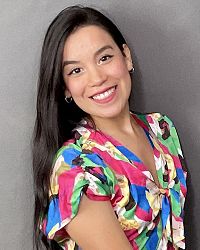
Let’s Talk About Bats: Citizen Science for One Health in Peru (AOH)
Advisor: Bruce Lewenstein
Bats are widely known as vectors for viruses such as rabies. However, their essential roles in the ecosystem are ignored as pollinators, seed dispersers, and pest controllers. This dichotomy of bats as a health threat and an essential part of the ecosystem has big implications for humans, bats, and the ecosystem. “Let’s talk about bats” is a citizen science project that seeks to improve human health, the bat community, and ecosystem services through a cooperative national sampling of bats’ distribution in Peru’s urban and rural areas. This study considers the participation of non-scientists in obtaining information about bats’ species and their presence using acoustic methods. As a result of non-scientists participation in the study and systematic conversations with scientists, Vilchez expects to encourage positive perceptions of bats and decrease negative interactions with them. Simultaneously, bat distribution information obtained by non-scientist participation will be relevant to future bat conservation measures around Peru.
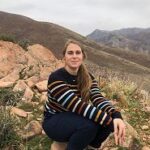
Ten recipients across Accelerating Energy Transitions (AET), Advancing One Health (AOH), Increasing Food Security (IFS), and Reducing Climate Risk (RCR): from Animal Science, Entomology, Food Science & Technology, Global Development, Horticulture, Plant Biology, Plant Breeding & Genetics, Science & Technology Studies, and Soil & Crop Sciences
Martin Abbott (Science & Technology Studies)

Redrawing Risk in FEMA’s National Flood Insurance Program: “Equity in Action” or Equity Inaction? (RCR)
Martin Abbott is a Ph.D. candidate in the Department of Science and Technology Studies. His research is concerned with the scientific and social nature of urban flooding, risk, and map-making. This research focuses on New Orleans and how the Federal Emergency Management Agency has refined the city’s Flood Insurance Rate Maps. These maps form the backbone of FEMA’s trillion-dollar National Flood Insurance Program and are among governments’ most powerful tools to minimize the impact of flooding and adapt cities to climate change. Martin’s preliminary analysis shows that urban flood risk is underestimated, poorly understood, and disproportionately affects low-income groups and minorities.
Nikita Agarwal (Food Science & Technology)
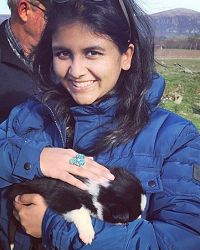
Grape Pomace Waste, as Natural Alternatives for Antibiotic Growth Promoters in Poultry Feed (AOH)
Nikita Agarwal is a PhD student working with Dr. Elad Tako on finding natural and sustainable alternatives to antibiotics in poultry feed. Antibiotic growth promotors pose a risk of increasing antibiotic-resistant microbes that can spread to humans through meat consumption. On the other hand, the wine and grape juice industry produces over 70 million tons of grape pomace “waste” annually. This low-cost by-product is a rich source of phenolic acids, which leads to soil pollution when discarded. With the funding from Cornell Atkinson, Nikita’s research will aim to reclassify this waste as a co-product by evaluating its effects on various aspects of poultry gut health.
Jenny Berkowitz (SIPS Horticulture)
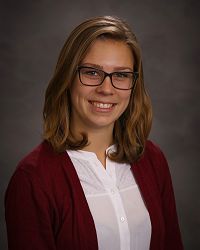
Developing a Soil Health Index for Urban Agricultural Soils to Support Food Security (IFS)
Jenny Berkowitz is a Ph.D. student co-advised by Thomas Björkman and Jenny Kao-Kniffin. Her work examines processes for developing soil health practices that fit farmer and community goals. This study seeks to utilize participatory methods to build off New York City Farmer experience and create an Urban Soil Health Index. Urban farming has gained widespread enthusiasm for its immense potential to increase food security, particularly for the many urban growers who are people of color and from working-class backgrounds that experience food insecurity. Urban farmers have developed their own methods for assessing their soil health, some of which are not included or addressed in current rural soil health metrics. When farmers test their soils for standard health parameters, they have no guides to compare the “optimal” or “aspirational” ranges they would expect to see. The Urban Soil Health Index will be created by and for urban farmers to address these gaps.
Lauren Brzozowski (SIPS Plant Breeding & Genetics)
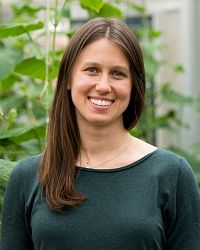
Leveraging Plant Immune Responses for Increased Food Security (IFS)
Lauren Brzozowski is a postdoctoral research associate advised by Dr. Jean-Luc Jannink in Plant Breeding & Genetics. As a plant breeder, she is interested in breeding new plant varieties for sustainable agricultural systems, especially those that contribute to ecological pest management. Lauren currently focuses on genetic research of phytochemicals in oat (Avena sativa) that contribute to plant disease resistance and to human health. Funding from the Atkinson Center will support her work in conducting new research to test whether oat varieties have different immune responses that can increase antioxidants and disease resistance. Studying how plants vary in their immune responses is a promising research area for breeding plants for resistance to pests and disease. This work can improve oat cultivation practices and provide a basis for studying other crop plants to promote food security in our changing climate.
Mohammad Irfan (SIPS Plant Biology)
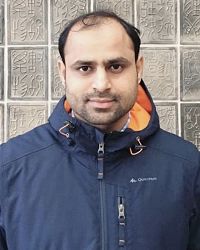
Investigating the Role of Carotenoids in Improving Sustainable Agriculture of Sweet Potatoes Under Water Stress (IFS)
Mohammad Irfan is a postdoctoral research associate working with Gaurav Moghe in the Plant Biology Section of the School of Integrative Plant Science. He works in the field of plant-specialized metabolic pathways and high-value phytochemicals, such as anthocyanins and carotenoids of sweet potato, a nutritious superfood. The primary aim of this project is to address food security issues and improve the sustainable agriculture of sweet potatoes. Using transcriptomic and metabolomic approaches, he will investigate the role of carotenoids in sweet potato’s response to water-challenging conditions, which is expected to affect sweet potato yields in the coming decades as per future climate predictions. This project also aims to study the carotenoid’s metabolism during the sweet potato’s interactions with arbuscular mycorrhizal fungi during water stresses.
Morgan Irons (SIPS Soil & Crop Sciences)
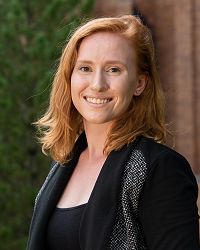
The Effects of Bacterial Organic Adhesives on Carbon Sequestration in Soils for Climate Change Mitigation (RCR)
Morgan A. Irons (she/her/they/them) is a Ph.D. candidate working with Johannes Lehmann to examine how bacterial organic adhesives affect carbon mineralization and sequestration through organo-organic and organo-mineral interactions in aggregates. The proposed work will use atomic force microscopy, scanning transmission electron microscopy, and spectroscopy techniques to obtain a mechanistic understanding of the spatial and chemical complexity of bacterial organic adhesive in soil aggregates, understand how that, in turn, confers persistence to other soil organic matter and carbon, and determine the chemical and surface morphology mechanism of adhesion between model bacterial species and relevant organic and mineral substrates. As soil contains the largest terrestrial pool of organic carbon (OC), understanding how OC occludes and turns over in soil is integral to accurately predicting and managing carbon sequestration and long-term soil fertility. The research will thus contribute to a more holistic understanding of how soil microbiomes affect carbon cycling and contribute to the development of more informed management strategies for combatting climate change and soil degradation.
Rachelle LaCroix (SIPS Soil & Crop Sciences)
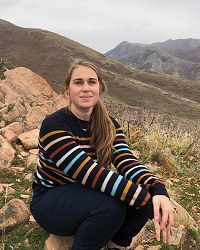
Does Plant Litter Type and Microbial Diversity Effect Soil Organic Matter Molecular Diversity? (RCR)
Rachelle LaCroix is a Ph.D. candidate advised by Dr. Johannes Lehmann in Soil and Crop Sciences. Rachelle’s research is focused on identifying soil biogeochemical mechanisms that contribute to long-term storage of soil organic carbon. The funding provided by the Cornell Atkinson grant will enable her, with the help of her undergraduate researcher Caleb Levitt, to better understand the role of plant litter type and microbial diversity on the decomposition of soil organic matter. Improving our fundamental understanding of complex biogeochemical processes will increase our ability to adapt soil management policies to a changing climate.
Andres Ortega (Animal Science)
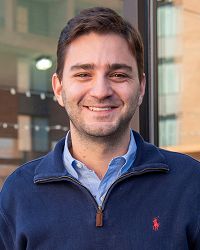
Abomasal Infusion of Nutritionally Non-Essential Amino Acid for Evaluation of Overall Amino Acid Utilization and Productive Efficiencies in Lactating Dairy Cattle (IFS)
Andres Ortega is a Ph.D. Candidate mentored by Dr. Mike Van Amburgh, whose group works to further develop the Cornell Net Carbohydrate and Protein System (CNCPS). The CNCPS is a nutritional model used by dairy farmers around the world to formulate cattle diets and predict productive performance. Andres’s research focuses on amino acid (AA) chemistry methods and metabolism in dairy cows in support of lactation and other nutrient demands. He is interested in developing novel methods to analyze the AA composition of different substrates using liquid chromatography with tandem mass spectrometry (LC-MS/MS) to better characterize the chemical composition of various model components. In this study, he will examine the role and energetic demand of non-essential AA for milk and milk component synthesis. The objective is to be able to improve diet formulation and further improve productive efficiency. This can result in less N excreted into the environment and lower feed costs for dairy producers.
Annika Salzberg (Entomology)

Trap Crops for Flea Beetle Control in Cabbage Fields (IFS)
Annika is a Master’s student in Katja Poveda’s lab in the Department of Entomology. As an agroecologist, her research centers around landscape ecology and the effect of landscape simplification on insect body size, abundance, and diversity–and subsequently how these factors affect crop damage and yields. She will use her Cornell Atkinson funding to conduct applied agricultural research into managing flea beetles through trap cropping in New York State. Determining viable trap crops will provide a new and more sustainable pest control practice for local growers, decreasing the frequency and/or amount of pesticides needed to maintain yields, and minimizing detrimental effects of pesticide sprays on surrounding ecosystems.
Camillo Stubenberg (Global Development)

Energy Transition as Last Resort: The Adoption of Decentralized Renewable Energy Technologies in the Wake of State Absence and Fossil Fuel Shortages in Lebanon (AET)
Camillo Stubenberg is a Ph.D. Student in the Department of Global Development. He is advised by Lori Leonard, Jenny Goldstein, and Sara Pritchard. Camillo will use this funding to conduct field research in Lebanon in the fall of 2022, examining the rushed adoption of off-grid and renewable energy technologies in Lebanon, where an interlocking political and financial crisis has led to a total breakdown of the country’s electricity sector. In the summer of 2021, a convergence of political, financial, and infrastructural crises led to severe fuel shortages. Without the diesel necessary to run both the state’s power plants and private backup generators, the country was quite literally plunged into darkness. As a result, households, communities, and businesses are scrambling to access off-grid and renewable energy systems. The project aims to answer three related questions. First, how does an energy transition take place in the “absence” of fossil fuels and state regulation? Second, how do emerging green energy startups alter electric connections and reconfigure existing political and social patterns? And finally, how does connection to decentralized and renewable infrastructure affect end-users’ energy behavior and political outlook? By shedding light on the ongoing dynamics in Lebanon, this research provides insights both for the design of renewable energy systems as well as policies aimed at fostering energy transitions across the globe.
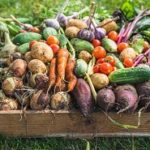
Increasing Food Security (IFS): Five recipients from Global Development, Horticulture, and Masters of Public Health
Maria Arnot (Masters of Public Health)
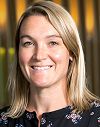
Effectiveness of Motivational Interviewing on Adult Dietary Changes
Cornell Cooperative Extension (CCE) launched a Produce Prescription Program in Tompkins County in 2018 to prescribe fruits and vegetables as medicine for high-risk participants with low food security, low income, and diet-related health issues. Simultaneously, this program supports local organic farmers who grow and sell the fresh produce that is provided to program participants weekly. By 2020, the program had expanded to 75 participants. Working with Baz Perry at CCE, Master of Public Health candidate Maria Arnot will assess the effectiveness of motivational interviewing on the participants’ dietary changes through this program. While research shows that motivational interviewing can be influential in promoting lifestyle changes, especially in substance abuse treatment, minimal research is available as to how this can be applied to dietary behavior changes, particularly when paired with existing produce prescription programs
Emily Baker (Global Development)
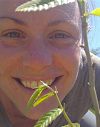
Participatory Agrobiodiversity Mapping Informs Sustainable Livelihoods, Food Security, and Socio-ecological Resilience
Emily Baker is a Ph.D. student studying smallholder farmers’ cultivation and understanding of agricultural biodiversity in the Rwenzori Mountains of eastern Democratic Republic of the Congo and western Uganda. Diversified agroforestry and home garden systems have gendered implications for smallholder social and ecological resilience, livelihoods, and food security. Working with Rachel Bezner Kerr, Baker seeks to understand the ways that intersectional and intergenerational agrobiodiversity knowledge and agency are linked with macro drivers of social and environmental change, and can inform policy approaches and community decision-making for local conservation, food security, and equitable approaches to social and ecological resilience.
Emily Hillenbrand (Global Development)

Engaging Men to Improve Gender Equality, Food Security, and Sustainable Livelihoods in Malawi
Emily Hillebrand is a Ph.D. candidate working with Rachel Bezner Kerr, examining processes and implications of gender-transformative approaches and shifting masculinities in Burundi and Malawi’s agriculture development. Her research will be conducted in partnership with Soils, Food, and Healthy Communities (SFHC), a farmer-led non-profit organization that addresses the challenges of soil infertility, climate change, food insecurity, and gender inequality in Malawi. This study will be carried out in 10 SFHC target communities, reaching more than 300,000 people, to examine the effects of a gender-transformative intervention on couples’ key household negotiations related to food security, nutrition, and livelihood strategies. The study will pay particular attention to how men participate in gender activities and what factors contribute to their engagement and personal changes.
Connor Lane (Horticulture)

Apple Microbiome Responses to Preharvest Chemical Treatments Affecting Ethylene Production
Connor Lane is a Ph.D. student advised by Jenny Kao-Kniffin. While plant microbiomes are increasingly recognized as important for the optimal functioning of agricultural systems, little is known about fruit-associated microbiomes. The apple microbiome is of interest due to the role microbes play in apple diseases and spoilage during postharvest storage. In this study, Lane proposes investigating the microbiome response to different plant growth regulators that slow ripening and spoilage by limiting ethylene production. He will also examine the apple microbiome’s functional traits. These findings on microbial dynamics related to treatments with postharvest effects will pave the way to a greater understanding of food spoilage and dietary effects on the human gut microbiome.
Yejin Son (Horticulture)

Uncovering the Role of Polyphosphate Accumulating Organisms and Arbuscular Mycorrhizal Fungi in Soil for Enhanced Soil Health and Carbon Sequestration
Healthy soils are fundamental for food security, but intensive farming practices have negatively impacted various aspects of soil health, including soil aggregation and carbon storage. Soil microorganisms, especially certain fungi, aid soil organic carbon sequestration, but much remains unknown about these collaborative effects. Advised by Jenny Kao-Kniffin, Ph.D. student Yejin Son’s research aims to discover how polyphosphate accumulating organisms (PAOs) recovered from manure could work with these fungi to sequester organic carbons in the rhizosphere of Irish Potato, potentially leading to improved food security and agricultural techniques, as well as increased use of PAOs as a phosphorus biofertilizer option and climate change mitigation.

Reducing Climate Risk (RCR): Four recipients from Architecture, Chemical and Biomolecular Engineering, Soil + Crop Sciences, and Veterinary Medicine
Laurel Lynch (Soil + Crop Sciences)

Defining Fundamental Tradeoffs Between Microbial Activity and Soil Carbon Sequestration
Laurel Lynch is a postdoctoral associate advised by Johannes Lehmann in the Department of Soil and Crop Sciences. As an ecosystem ecologist, she is interested in how microbial and environmental drivers influence the molecular composition of dissolved organic matter. With this funding, Laurel seeks to better understand how the composition and spatial distribution (between soil horizons and across landscapes) of microbial residues shape systems-level Carbon cycling. These natural climate solutions have the potential to meet ~40% of the carbon reductions needed to keep climate warming below 2°C and confer co-benefits, such as wildlife habitat, improved human health outcomes, and better air and water quality.
Prince Ochonma (Chemical and Biomolecular Engineering)
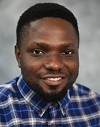
Accelerated and Sustainable Bio-Hydrogen Generation with Integrated Carbon Capture and Storage Technology for Advancing a Negative Emissions Future
Prince Ochonma is a Ph.D. student in the Smith School of Chemical and Biomolecular Engineering, advised by Greeshma Gadikota. This project involves developing accelerated and sustainable bio-hydrogen generation with integrated carbon capture and storage technology, to advance a negative emissions future by producing H2 from renewable biomass sources with in-situ CO2 capture. The building blocks for this technology include water, aqueous or solid biomass, and alkaline resources such as industrial residues or naturally occurring minerals. This technology could be integrated with a bio-refinery and adapted to utilize agricultural or dairy waste generated in rural communities, or food waste in rural and urban regions. Sophomore Claire Blaudeau also received a supplemental undergraduate grant to assist with this research.
Ranaivo Rasolofoson (College of Veterinary Medicine)
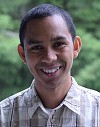
Drowning and Climate Change in Small-scale Fishing Communities Around Lake Victoria
Ranaivo Rasolofoson is a postdoctoral research associate in the College of Veterinary Medicine, advised by Kathryn Fiorella. He is interested in investigating the impacts of environmental programs and environmental changes on human wellbeing and environmental outcomes. With support from Cornell Atkinson, Rasolofson will explore the potential effects of climate change on drowning deaths in small-scale fishing communities in low-income country settings, to raise awareness on the necessity of effective measures to mitigate the effects of climate change of such communities.
Yang Yang (Architecture)

Energy and Mobility-aware Urban Design: A Mobility Simulator Assisting Urban Design Decision-making for Mitigating Energy Consumption and Transportation Emissions
Yang Yang is a master’s student advised by Timur Dogan in the Department of Architecture. She will use funding from Cornell Atkinson to develop a mobility simulator to aid urban design decision-making for mitigating energy consumption and transportation emissions. The research is expected that it will enhance the design and planning of mobility solutions, energy use, and urban form. This could facilitate the early discovery of synergies that lead to better cities with lower energy consumption and greenhouse gas emissions.
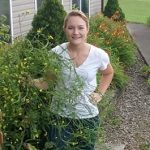
Increasing Food Security (IFS): Four recipients from Entomology, Soil and Crop Sciences, Natural Resources, and Plant Breeding and Genetics
Reducing Climate Risk (RCR): Four recipients from Architecture, Anthropology, Biological and Environmental Engineering, and Soil and Crop Sciences
Ashley Jernigan (Entomology)

Elucidating the Effect of Soil Fauna on Crop Yields through Nutrient Cycling (IFS)
Ashley Jernigan is a PhD student in Kyle Wickings’ lab in the Department of Entomology. She is interested in the effect of soil microarthropods on crop productivity and agroecosystem functioning. Her research explores how changes in microarthropod abundance and community composition impacts nutrient cycling and plant pathogen transmission and suppression. With this funding, Ashley is completing a project investigating how alterations to microarthropod abundance and community composition impacts soil nitrogen cycling and plant nutrient acquisition under different fertilizer treatments. Elucidating these important agroecosystem relationships will allow for improved management of crops and will lead to increased system resiliency.
Eugene Law (Soil and Crop Sciences)

Soil Carbon Storage and Soil Structure Impacts of ‘Kernza’ Intermediate Wheatgrass (IFS)
Eugene Law is a PhD candidate in Soil and Crop Sciences co-advised by Toni DiTommaso (Weed Ecology and Management Lab) and Matt Ryan (Sustainable Cropping Systems Lab). His current research explores the development of cropping systems and market opportunities for two novel perennial grain crops, intermediate wheatgrass and perennial cereal rye, using a systems approach that incorporates aspects of agronomy, ecology, soil science, and economics. He will use funding from the Atkinson Center to expand the breadth of his research on how perennial grain crops might enhance soil health by comparing indicators of soil carbon storage and soil structure regeneration in fields of perennial intermediate wheatgrass and annual wheat.
Ryan Lepak (Natural Resources)

Tracing Sources of Mercury Contamination in Freshwater Fisheries Across Space and Time (IFS)
Ryan Lepak is a postdoctoral research associate working with Peter McIntyre in the Department of Natural Resources, Casey Dillman, Cornell Museum of Vertebrates and the Mercury Research Laboratory in the US Geological Survey. His research focuses on understanding current and past sources of neurotoxic methylmercury to freshwater fisheries of central Africa by measuring stable isotope tracers in fish preserved in museums worldwide. The support from SBF will allow Ryan to visit and subsample fish from European museums that predate many instances of anthropogenic mercury contamination like mercury-mediated small-scale artisanal gold mining which has expanded rapidly in this region in unregulated ways. Accessing greater spatial and temporal coverage from museums specimens will allow Ryan to better inform the region of the extent of contamination and inform these impoverished nations of realistic baselines they may strive to achieve for safer fish consumption.
William Stafstrom (Plant Breeding and Genetics)
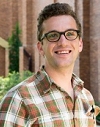
Modeling Mycotoxin Risk in a Tanzanian Smallholder Farming System (IFS)
Will Stafstrom is a Plant Breeding and Genetics graduate student working in Dr. Rebecca Nelson’s maize disease lab. He studies various ways of mitigating the harmful effects of mycotoxins produced by maize fungal pathogens. His research spans multiple scales from the genetic basis of mycotoxin resistance to landscape wide indicators of mycotoxins. His work supported by the Atkinson Center will focus on modeling mycotoxin risk in a smallholder farming system in Tanzania by integrating local surveys of mycotoxins with remote sensing datasets of environmental factors. This project intends to improve understanding of mycotoxins’ relationship with environmental conditions and to develop a useful tool for predicting mycotoxin risk areas on a yearly basis.
Allison Bernett (Architecture)
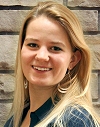
Early Design Decision-making Framework for Simulating Building Energy, Carbon, and Cost (RCR)
Allison is pursuing a master of architecture degree and working in Dr. Timur Dogan’s Environmental Systems Lab in the architecture department. Prior to Cornell, Allison worked as a sustainability consultant. Her research in the lab focuses on developing an early design decision-making building simulation framework that when furnished with basic inputs generates design options that can be filtered by energy performance, carbon footprint, and cost criteria. Given that architects make critical early design decisions on orientation, massing, and structure that significantly affect the energy use and carbon footprint of the design, such a framework aims to better inform these initial decisions, reducing time and cost while improving building performance.
Luisa Cortesi (Anthropology)
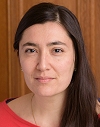
The Flood Room (RCR)
Luisa Cortesi (PhD, Yale, Forestry and Environmental Studies and Anthropology) is currently the S.H. Taylor postdoc in Anthropology and STS. She is an environmental anthropologist, interested in the environmental knowledge of increasingly disastrous waters, in particular floods and toxic drinking water, and environmental justice. She works primarily in North Bihar, India, a place that is recurrently flooded and increasingly so, where she asks under which conditions are people better equipped to face a disaster.
Alexa Schmitz (Biological and Environmental Engineering)
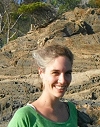
Extracting Rare Earth Elements with Engineered Microorganisms for Sustainable Energy (RCR)
Alexa is a postdoctoral researcher with the Barstow Lab in the Department of Biological and Environmental Engineering. Her research focuses on the development of an efficient and sustainable solution to the growing demand for rare earth elements in light of their utilization for renewable energy technologies, especially wind turbines. In collaboration with researchers at the Idaho National Lab, Alexa is using the bacterium, Gluconobacter oxydans, to extract these critical metals from end-of-life waste materials via its production of strong, but biodegradable, organic acids. This bioleaching process will hopefully replace some of the more harmful technologies currently in place for rare earth extraction. Funding from the Atkinson Center will support Alexa’s development of whole-genome knockout collections in G. oxydans, allowing her to comprehensively identify genes underlying the bioleaching process that can be targeted for improvement through bioengineering.
Itamar-Ariel Shabtai (Soil and Crop Sciences)

Can Improved Drainage Water Management in Peat Soils Reduce Greenhouse Gas Emission and Optimize Crop Yields? (RCR)
Itamar Shabtai is a postdoctoral fellow in the School of Integrative Plant Science working in Johannes Lehmann’s lab. He is interested in how soil water content can be managed to stabilize organic carbon in the soil. Peat soils contain more organic carbon than all the forests of the worlds combined but their degradation under agricultural use is responsible for 6% of all anthropogenic CO2 emissions. Itamar will leverage ACSF funding to study how improving the water budget of agricultural peat soils can minimize peat carbon decomposition. This work will help develop management tools to reduce CO2 emissions from agricultural peat soils.
